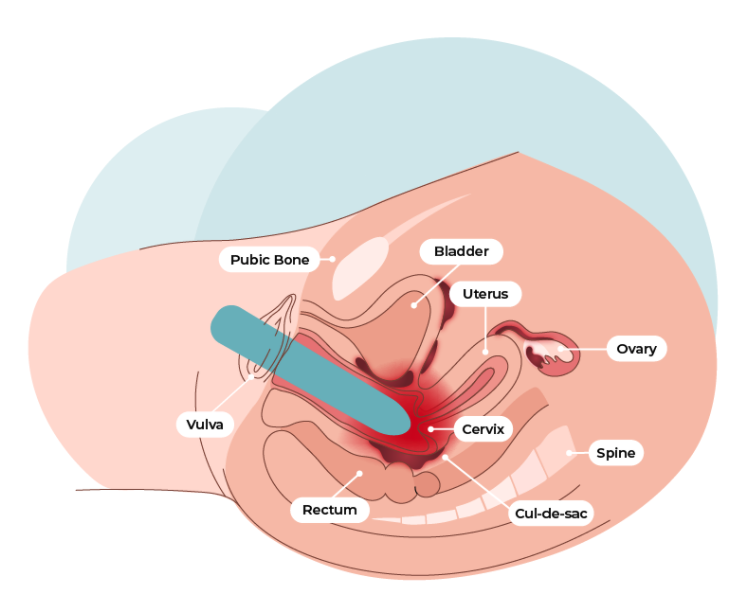What is Endometriosis?
Endometriosis is a medical condition where tissue similar to the lining inside the womb (uterus) begins to grow outside of the uterus. This tissue can be found on the ovaries, fallopian tubes, bowel area and other organs within the pelvis and around the body. In the UK, around 1.5 million women and those assigned female at birth (AFAB) are currently living with the condition. Yet, the number is most likely higher due to the dismissal of pain, symptoms being misdiagnosed and waiting times for a diagnosis being painstakingly long.
The most common Endometriosis symptoms can include any or all of the following:
- Pelvic pain,
- painful periods that interfere with everyday life,
- painful bowel movements,
- bloating, pain when urinating,
- difficulty getting pregnant,
- fatigue,
- leg and back pain,
- depression and anxiety
- and finally, the one you’ve come to explore in this article, pain during or after sex.
Pain during or after sex, also known as dyspareunia, is a significant issue for many individuals living with Endometriosis. This symptom can profoundly impact relationships and overall quality of life. In the following article, we delve deeper into why Endometriosis causes painful sex, how to start to take control of your pleasure and my favourite products that have helped me regain my confidence and support me through pain and that I think will help you too.

What is the link between painful sex and Endometriosis?
Many individuals with Endometriosis endure pain during or after sex and even orgasm, and this is because the endometrial tissue grows in various areas around the uterus, fallopian tubes, the posterior of the vagina, and even the bladder and bowels. When penetration is happening, it may begin to agitate, stretch and irritate the tissue, resulting in sensations of burning, stabbing, aching, or even nausea.
Also, Endometriosis can cause the formation of adhesions—scar tissue bands that bind organs together, which can restrict normal pelvic organ movement during intercourse and, in turn, cause pain and discomfort that can last for hours.
Another significant contribution to pain is the tightening of our pelvic floor muscles. Our pelvic floor muscles play a huge role in our sexual comfort for both men and women and unfortunately, this is not something we are educated on despite its importance. Living with chronic pain from Endometriosis can lead to anxiety and fear, which in turn causes our bodies to tense. When our pelvic floor muscles are overly tense or tight, it can make penetration uncomfortable or painful. This tension may result in difficulty accommodating penetration of any kind. Exploring how to relax your pelvic floor through mindfulness techniques and pelvic floor exercises can significantly help reduce tension and tightness.
Taking control of your pleasure
From a young age, we are taught specific social norms and expectations around sex and what is considered to be ‘normal’. However, this one-size-fits-all doesn’t work for everybody, especially those experiencing pain. This is why I encourage you to think about the messages and expectations you have been taught to believe around sex and what is considered ‘good sex’ or ‘real sex’ and start to challenge those for yourself. It’s essential to recognise that our sexual experiences are diverse and unique, and finding a path that aligns with your comfort and well-being is vital to cultivating more pleasurable sex.
So how do we do this?
Solo Exploration
Masturbation can be an excellent tool for determining our levels of comfortability, areas of avoidance, limitations, and what we like. One tool you can start using to explore your comfort level is experimenting with dilators. While these sound clinical, they are far from that now, thanks to the development of toys over the years. One of my favourite sets is the silicone vibrating dilator kit. They are soft and silky for those sensitive areas and have a beautiful ergonomic curve. Dilators are designed to help reduce pain and potentially anxiety around penetration. They often come in different widths, from very narrow to thick, so you can start small and progressively work your way up to a more comfortable and larger size when required.
Other reasons to explore solo exploration:
- There is no pressure to perform or feel rushed into a particular act that doesn’t feel comfortable for you
- It may help increase your libido and your interest in sex if you can explore what you like alone first
- You can also give your pelvic floor a workout (Yes, masturbating counts!)
- Masturbating increases blood flow and can help relieve cramps
Did you know: When we orgasm, it signals the parasympathetic nervous system to shut down, which in turn has a calming effect on the body. The brain also pumps out serotonin, which is responsible for our mood and that lovely feeling of relaxation post-orgasm. There is also the release of oxytocin, which helps us feel good and connected to our partners or ourselves and can also help relieve pain.
Positions and making foreplay main play
Extending foreplay is an absolute must, and even try exploring this without it leading to any penetrative sex once in a while. Remember, sex does not equal penetration and is more about enjoying pleasure in whatever form it takes for you. For most vulva/vagina owners, foreplay is considered the best part of sex, so why not make it the main event? Foreplay not only relaxes the body but it creates excitement and, in turn, lubricates the vagina further, which is essential to comfortable intercourse.
Another consideration for comfort is exploring positions. Some individuals may initially find discomfort in every position. Still, I suggest thoroughly experimenting with various ones and even using the Karma Sutra to help, as there’s a good chance you’ll discover one that suits you well. Elevating your lower half can make a huge difference, and investing in a Bang On cushion could benefit those interested in exploring this. Bang On cushions provide support for individuals with disabilities and medical conditions, aiding in pain relief and comfort during sexual activity.
Quick Tip: Also, it might be helpful to track your cycle when it comes to planning a slightly more pain-free sexual experience. Your cervix usually sits lower in your vagina during your period, so it might be easier to feel then.
Tools and Helpful Products
Ohnuts: The Ohnuts consist of four stretchy, squishy rings that can be stacked onto the base of the penetrating object so you can discover the depths that feel comfortable for you. The Ohnuts are designed to help you avoid deep pain during sex and also ensure you are not sacrificing sensation while exploring penetration.
Lube & CBD Lube: Lube is your best friend when you have Endometriosis because the last thing you want is dry, forceful and rough penetration. However, finding the right lube for you is like finding the perfect pair of shoes; you will have to try a few until you find the perfect fit. There are plenty of great lubes on the market, and I highly recommend investing in something with natural and high-quality ingredients; trust me, your vagina will love you for it. A few of my favourites are:
- A premium organic CDB pleasure lube: byquanna (read FrolicMe’s review here on CBD lube)
- A CBD-infused natural lubricant: The Fleur Damour
- Water-based sexual enhancement gel: Morgasm
Sexuality is a lifelong journey. Enjoy the ride, even the bumpy bits!
Nurturing our sexuality and navigating pain is a lifelong journey. Sometimes, it will feel like you’ve taken two steps back to take one step forward, but the important thing is to remain patient and compassionate with yourself throughout this process. Embracing your sexuality involves self-discovery, acceptance, and ongoing communication, both with yourself and, if applicable, with your partner(s). There may be moments of vulnerability and uncertainty, but these are integral parts of the growth and evolution of your sexual well-being. Remember that societal norms and expectations can vary, and what matters most is aligning with your own values and desires. Celebrate your progress, no matter how small, and recognise that setbacks are opportunities for learning and further self-reflection.















